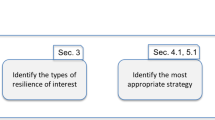Abstract
There are many definitions of resilience. Their common core is that it is a response to unexpected or unforeseen changes and disturbances, and a capacity to adapt and respond to these changes. In the literature, many different concepts were identified to accompany resilience and help define or measure a system's resilience. These include flexibility, vulnerability, rapidity and robustness. However, these concepts are sometimes used interchangeably with resilience as there is a lack of clarification among them. In addition, the role of “lessons learnt” and “learning” after a disruption is somehow neglected in existing studies of resilience and system performance. This article aims to position resilience regarding these concepts, taking into account the system's experience after several disturbances. Schematic presentation of resilience-related concepts such as flexibility, rapidity, vulnerability and robustness are proposed. Additionally, an updated definition of resilience in a production system while considering the correlated concepts like vulnerability, robustness, flexibility, rapidity is proposed.
Access this chapter
Tax calculation will be finalised at checkout
Purchases are for personal use only
Similar content being viewed by others
References
Bhamra, S., Dani, K.: Burnard: Resilience: the concept, a literature review and future directions. Int. J. Prod. Res. 49, 5375–5393 (2011)
Holling, C.S.: Resilience and stability of ecological systems. Annu. Rev. Ecol. Syst. 4, 1–23 (1973)
Bruneau, M., et al.: A framework to quantitatively assess and enhance the seismic resilience of communities. Earthq. Spectra 19(4), 733–752 (2003)
Gunderson, L.H., Pritchard, L.: Resilience and the Behavior of Large Scale Systems. Island Press, Washington, D.C. (2012)
Zhang, W.J., Lin, Y.: On the principle of design of resilient systems – application to enterprise information systems. Enterp. Inf. Syst. 4(2), 99–110 (2010)
Zhang, W.J., van Luttervelt, C.A.: Toward a resilient manufacturing system. CIRP Ann. 60(1), 469–472 (2011)
Upadhyay, A., Naz, F., Gallab, M., Orvitti, D. Marinelli, G.: Developing a resilience framework for railway companies. In: Proceedings of the 33rd European Safety and Reliability Conference (ESREL). Research Publishing, Singapore (2023)
Erol, O., Sauser, B.J., Mansouri, M.: A framework for investigation into extended enterprise resilience. Enterp. Inf. Syst. 4(2), 111–136 (2010)
Bouloiz, H. :Sustainable performance management using resilience engineering. Int. J. Eng. Bus. Manage. 12 (2020) https://doi.org/10.1177/1847979020976205
Guibing, G., Wenhui, Y., Wenchu, O., Hao, T.: Vulnerability evaluation method applied to manufacturing systems. Reliab. Eng. Syst. Saf. 180, 255–265 (2018)
Liendle, M. : Vulnérabilité. In: Les concepts en sciences infirmières, Association de Recherche en Soins Infirmiers, Toulouse, pp. 304–306 (2012)
Goepp, V., Berrah, L., Caillaud, E.: A literature review on resilience approaches in the Industry 4.0 context. In: Borangiu, T., Trentesaux, D., Leitão, P., Berrah, L., Jimenez, JF. (eds.) Service Oriented, Holonic and Multi-Agent Manufacturing Systems for Industry of the Future. SOHOMA 2023. Studies in Computational Intelligence, vol. 1136, pp. 547–558. Springer, Cham (2024). https://doi.org/10.1007/978-3-031-53445-4_45
Sheffi, Y., Rice James, J.: A supply chain view of the resilient enterprise. MIT Sloan Manage. Rev. 47 (2005)
Hu, Y., Li, J., Holloway, L.E.: Towards modeling of resilience dynamics in manufacturing enterprises: literature review and problem formulation. In: Proceedings of the 2008 IEEE International Conference on Automation Science and Engineering, pp. 279–284. IEEE (2008)
Ge, L., Voss, S., Xie, L.: Robustness and disturbances in public transport. Public Transp. 14(1), 191–261 (2022)
Golden, W., Powell, P.: Towards a definition of flexibility: in search of the Holy Grail? Omega 28(4), 373–384 (2000)
Helaakoski, H., Iskanius, P., Peltomaa, I.: Agent-based architecture for virtual enterprises to support agility. In: Camarinha-Matos, L.M., Afsarmanesh, H., Novais, P., Analide, C. (eds.) Establishing the Foundation of Collaborative Networks. PRO-VE 2007. IFIP — The International Federation for Information Processing, vol. 243, pp. 299–306. Springer, Boston (2007). https://doi.org/10.1007/978-0-387-73798-0_31
Jackson, S.: Principles for resilient design-a guide for understanding and implementation. IRGC Resource Guide on Resilience. International Risk Governance Council, Lausanne, Switzerland (2016)
ISO/IEC/IEEE.:I SO 24765-Systems and Software Engineering – System and Software Engineering Vocabulary (SEVocab). International Organization for Standardization (ISO)/International Electrotechnical Commission (IEC) / Institute of Electrical and Electronics Engineers IEEE, Geneva, Switzerland (2010)
Stricker, N., Lanza, G.: The concept of robustness in production systems and its correlation to disturbances. Procedia CIRP 19, 87–92 (2014)
Acknowledgments
This study was partially funded by the Horizon Europe Project Manufacturing as a service to increase resilience in value networks – MAASive (Grant agreement ID: 101138040). Funded by the European Union. Views and opinions expressed are however those of the authors only and do not necessarily reflect those of the European Union. The European Union cannot be held responsible for them.
Author information
Authors and Affiliations
Corresponding author
Editor information
Editors and Affiliations
Rights and permissions
Copyright information
© 2024 IFIP International Federation for Information Processing
About this paper
Cite this paper
Pourabdollahian, B., Eslami, Y., Chenouard, R., Da Cunha, C. (2024). A Correlated Redefinition of the Concept of Resilience in a Production System. In: Thürer, M., Riedel, R., von Cieminski, G., Romero, D. (eds) Advances in Production Management Systems. Production Management Systems for Volatile, Uncertain, Complex, and Ambiguous Environments. APMS 2024. IFIP Advances in Information and Communication Technology, vol 728. Springer, Cham. https://doi.org/10.1007/978-3-031-71622-5_32
Download citation
DOI: https://doi.org/10.1007/978-3-031-71622-5_32
Published:
Publisher Name: Springer, Cham
Print ISBN: 978-3-031-71621-8
Online ISBN: 978-3-031-71622-5
eBook Packages: Computer ScienceComputer Science (R0)





